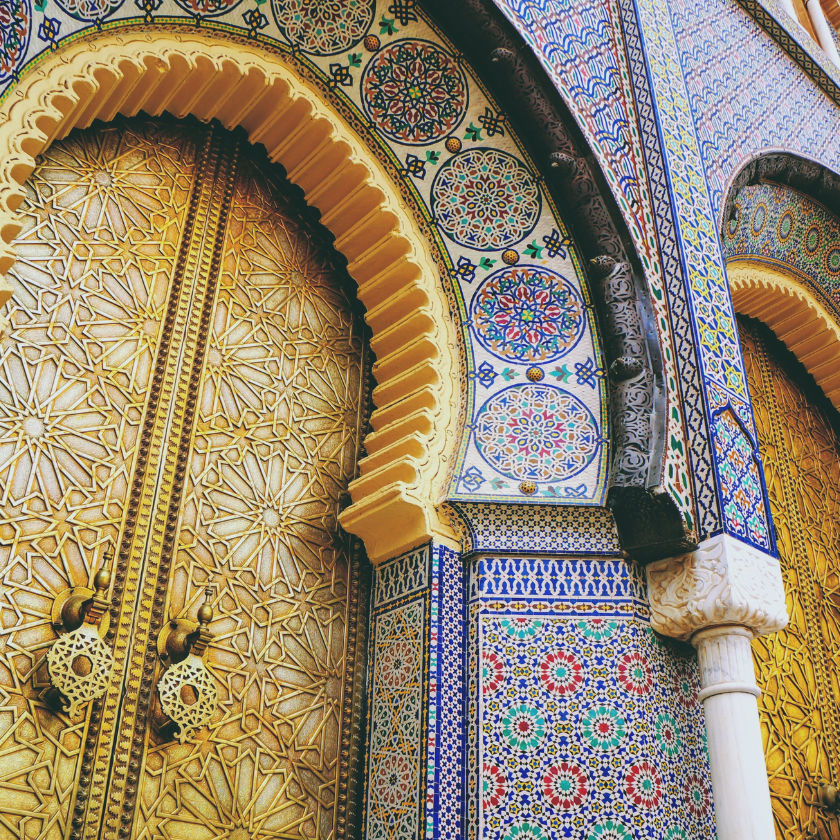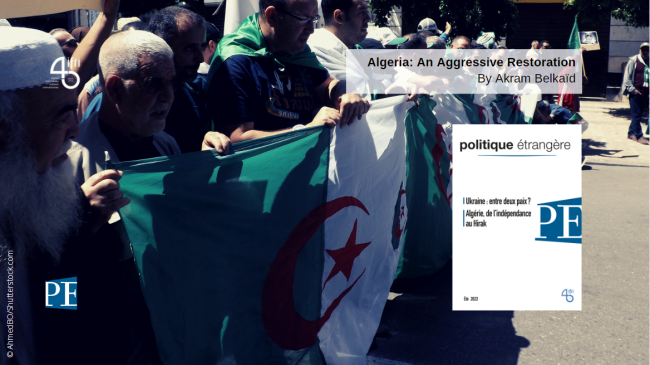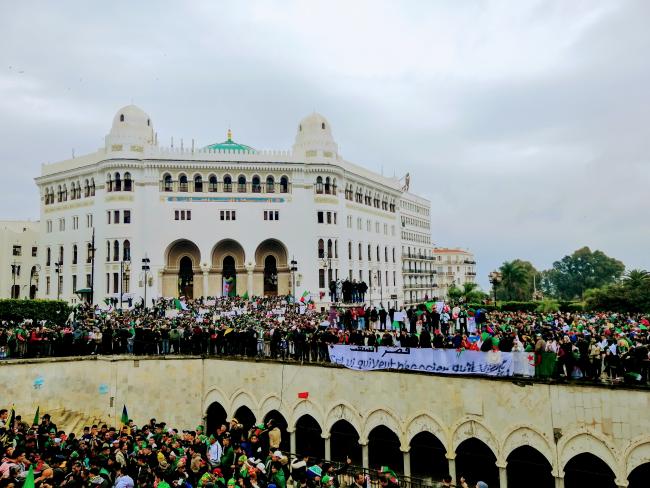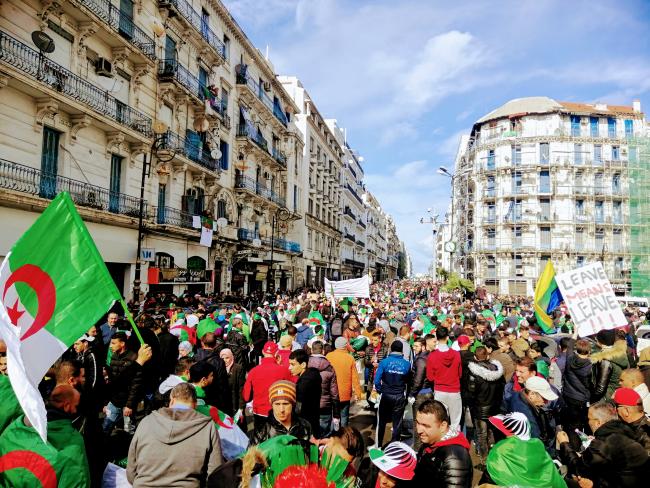North Africa
Expertise on the evolution of political, economic and social systems in the Maghreb. What role do North African countries play in the evolution of global geopolitical dynamics?

Algeria: An Aggressive Restoration
The election of President Abdelmadjid Tebboune, followed by the Covid-19 pandemic, marked the end of the road for the Hirak movement that had failed to establish itself as a political alternative despite its massive popularity.
The Shifting Foundations of Political Islam in Algeria
Understanding Algeria’s various Islamist communities—including militant groups, moderate factions, and grassroots movements—offers a window into the country’s uncertain sociopolitical future.
A Protest Made in Algeria
Since February 22, thousands and then millions of Algerians have taken to the streets every Friday to protest against the fifth term of their ailing eighty-two-year-old president, Abdelaziz Bouteflika.

A Time of Change for Algeria’s Foreign Policy
Having been formed in large part by the legacy of the post-independence diplomatic process, by forced withdrawal during the civil war and fixation on a few regional issues, Algerian diplomacy has to redefine itself in a rapidly changing world.
Arab Atatürk: The Weight of History
Recent discussion surrounding a 'Turkish model' for the Arab world has centered mainly on the achievements of the AKP in Turkey and its supposed ideological proximity to the political parties that have arisen from the Muslim Brotherhood movement.
Algeria: Cosmetic Change or Actual Reform?
Algeria has emerged as something of an “exception” across the Middle East and North Africa (MENA) region, and while the recent elections have been marred by widespread allegations of fraud, the results have effectively consolidated the regime’s grip on power thus ensuring its complete monopoly over the country’s reform process.
Arabs and Tuaregs in Colonial and Malian Armed Forces: A Story in Trompe-l'Oeil
This contribution consists in analyzing the unifying or opposing relations between the central State-power and the southern part of central-Saharan populations, mainly Arabs and Tuaregs, within the relational framework of colonial and Malian armed forces. The French Colonial State and the Malian independent State (from the 1960 independence movement) are both considered by Arabs and Tuaregs as external entities, whatever the form of their relation, good or bad.
Tuaregs' Relations to States: The Case of Algeria and Libya
The industrial revolution underwent by Europe in the 18th century has triggered the need for the major colonial powers to find new markets for their manufactured products. It is in this colonial competitive framework that European explorers delivered information about the different access roads, as well as the Tuareg tribes, notably the Kel Ajjer and the Kel Ahaggar.
Arabs and Tuaregs in Colonial and Malian Armed Forces: A Story in Trompe-l'Oeil
This contribution consists in analyzing the unifying or opposing relations between the central State-power and the southern part of central-Saharan populations, mainly Arabs and Tuaregs, within the relational framework of colonial and Malian armed forces.
Replay - Conference with Badr Abdelatty, Minister of Foreign Affairs of Egypt
Invited to Ifri on October 2, 2025, Egypt’s Minister of Foreign Affairs, Badr Abdelatty, highlighted Egypt’s doctrine of “strategic balance,” which is based on non-alignment and non-interference, while maintaining strong relations with major global powers such as the United States, Russia, and China.
The Shifting Foundations of Political Islam in Algeria
Understanding Algeria’s various Islamist communities—including militant groups, moderate factions, and grassroots movements—offers a window into the country’s uncertain sociopolitical future.
A Protest Made in Algeria
Since February 22, thousands and then millions of Algerians have taken to the streets every Friday to protest against the fifth term of their ailing eighty-two-year-old president, Abdelaziz Bouteflika.
Algeria: Cosmetic Change or Actual Reform?
Algeria has emerged as something of an “exception” across the Middle East and North Africa (MENA) region, and while the recent elections have been marred by widespread allegations of fraud, the results have effectively consolidated the regime’s grip on power thus ensuring its complete monopoly over the country’s reform process.
Arabs and Tuaregs in Colonial and Malian Armed Forces: A Story in Trompe-l'Oeil
This contribution consists in analyzing the unifying or opposing relations between the central State-power and the southern part of central-Saharan populations, mainly Arabs and Tuaregs, within the relational framework of colonial and Malian armed forces. The French Colonial State and the Malian independent State (from the 1960 independence movement) are both considered by Arabs and Tuaregs as external entities, whatever the form of their relation, good or bad.
Replay - Conference with Badr Abdelatty, Minister of Foreign Affairs of Egypt
Invited to Ifri on October 2, 2025, Egypt’s Minister of Foreign Affairs, Badr Abdelatty, highlighted Egypt’s doctrine of “strategic balance,” which is based on non-alignment and non-interference, while maintaining strong relations with major global powers such as the United States, Russia, and China.
Support independent French research
Ifri, a foundation recognized as being of public utility, relies largely on private donors – companies and individuals – to guarantee its sustainability and intellectual independence. Through their funding, donors help maintain the Institute's position among the world's leading think tanks. By benefiting from an internationally recognized network and expertise, donors refine their understanding of geopolitical risk and its consequences on global politics and the economy. In 2025, Ifri supports more than 80 French and foreign companies and organizations.











